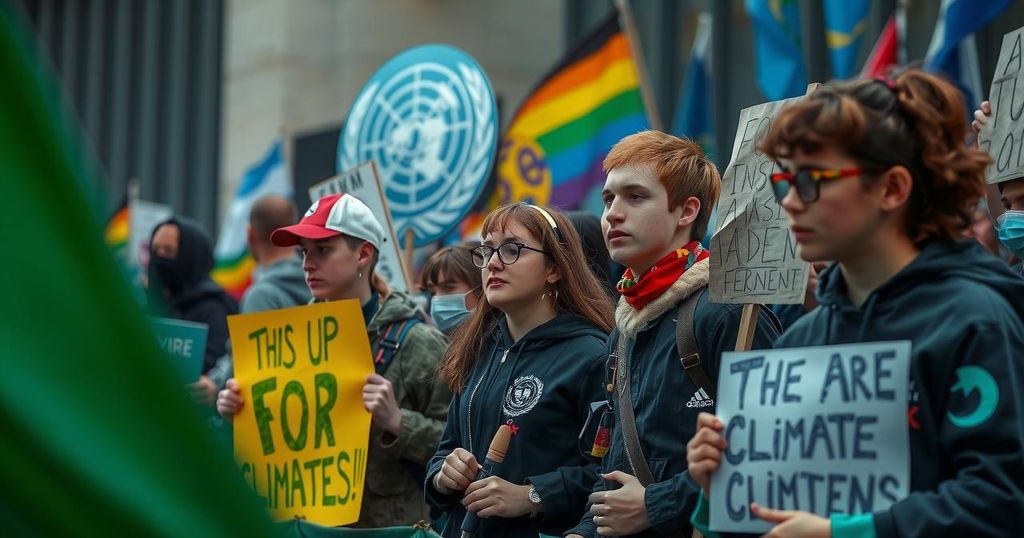Youth in Climate Talks: Navigating Anger and Championing Hope

Young people attending UN climate talks express deep frustrations over climate change’s impact, yet they continue to seek hope and spark action. Personal stories reveal significant loss and emotional turmoil, as some have experienced devastating natural disasters. Despite political challenges and systemic barriers, youth advocate for their rights and futures, highlighting the necessity for their voices in climate negotiations.
Amidst the ongoing United Nations climate talks, young individuals across the globe express a profound sense of anger and loss, stemming from the devastating effects of climate change on their lives. Many have witnessed catastrophic events that have disrupted their education and displaced their families. However, despite their challenges, they continue to rally their spirits, fighting for a more hopeful future. Marinel Ubaldo, a seasoned attendee of the COP summits at only 27 years of age, reflects on her harrowing experiences as a teenager in the Philippines. Having endured the aftermath of two significant typhoons that ravaged her community, she views her participation as crucial, despite having grown weary of being used merely as a symbol. While she expresses skepticism about the climate negotiations, she remains cautiously optimistic that COP29 could bring some clarity concerning their outcomes. Unfortunately, the current political landscape does not favor youth engagement. Decreased attendance from world leaders at this year’s conference, particularly from influential nations like the United States and Germany, signals a growing uncertainty about political commitment to climate action. Young advocates face additional challenges in authoritarian settings where protest and free speech are increasingly suppressed. Felipe Paullier, the assistant secretary general for youth affairs in the United Nations, acknowledges these hurdles. He emphasizes the necessity of institutionalizing youth involvement in climate discussions, as young people disproportionately bear the brunt of climate impacts. Kitty van der Heijden from UNICEF poignantly pointed out that society is failing children by not adequately securing their rights and wellbeing in the face of climate adversity. As young activists carry the burden of climate advocacy, many express fatigue from repeated efforts with minimal tangible results. For instance, 20-year-old Fathimath Raaia Shareef of the Maldives articulates her emotional turmoil, haunted by the existential threat to her homeland due to rising sea levels. Similarly, 15-year-old Francisco Vera Manzanares from Colombia describes the climate negotiations as a challenging yet necessary undertaking. He remarks on the “credibility crisis” faced by international institutions, urging adults to help amplify youth voices in conversations that fundamentally impact their futures. Fundamentally, today’s climate crisis serves as a catalyst, driving a generation to confront their fears and advocate for meaningful change. Their steadfast determination embodies their urgency for action, asserting their rights and futures amid an overwhelming atmosphere of despair.
The article highlights the emotional and existential struggles faced by young participants in the United Nations climate talks. It underscores how climate change has dramatically impacted their lives, causing loss of loved ones, homes, and educational opportunities. Despite their anger and frustrations, these young individuals continue to advocate for hope and change, demonstrating resilience and a desire for a better future. The narrative captures their direct experiences and insights during the climate negotiations, emphasizing the necessity of their involvement in shaping policies that will affect their generation.
In summary, young people are disproportionately affected by climate change, and their involvement in UN climate talks is crucial for representing their interests and rights. Despite facing numerous challenges, including political indifference and emotional fatigue, they remain committed to advocating for climate justice. Their voices are not only essential but represent the hopes and futures of generations yet to come, reminding the world of the urgent need for collective action against climate change.
Original Source: www.detroitnews.com





